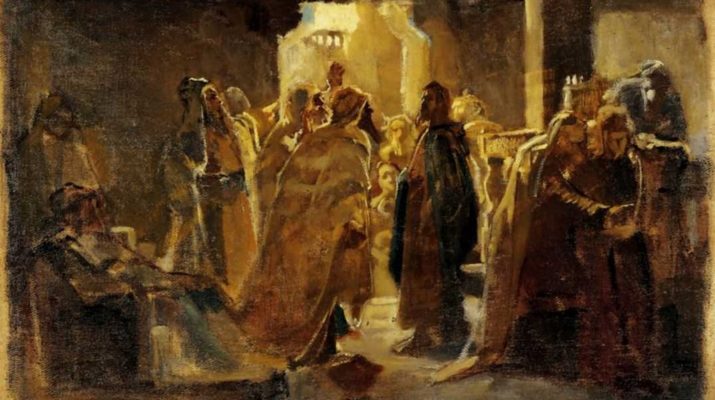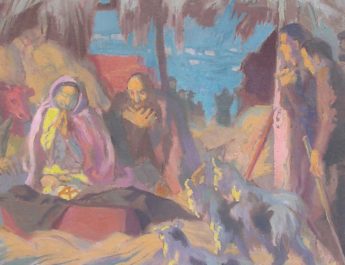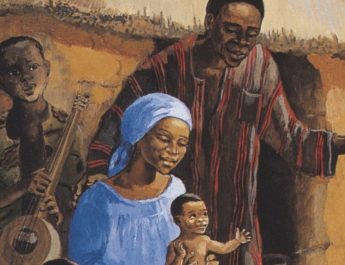Luke 4:14-30
Ordinary C9
14 Then Jesus,I filled with the powerII of the Spirit,III returned to Galilee,IV and a reportV about him spread through allVI the surrounding country.
I “Jesus” = Iesous. From Hebrew Yehoshua (Joshua, the Lord is salvation); {from YHVH (proper name of the God of Israel; the self-existent and eternal one); {from havah (to become) or from hayah (to come to pass, become, be)} + yasha (to deliver, defend, help, preserve, rescue; properly, to be open, wide or free, which implies being safe. So, in a causative sense, this is to free someone)}. This is Jesus or Joshua in Greek – the Lord saves or the Lord is salvation.
II “power” = dunamis. From dunamai (to be able, have power or ability). This is might, strength, physical power, efficacy, energy, and miraculous power. It is force literally or figuratively – the power of a miracle or the miracle itself.
III “Spirit” = pneuma. From pneo (to blow, breath, breathe hard). This is wind, breath, or ghost. A breeze or a blast or air, a breath. Figuratively used for a spirit, the human soul or part of us that is rational. It is also used supernaturally for angels, demons, God, and the Holy Spirit. This is where pneumonia comes from.
IV “Galilee” = Galilaia. From Hebrew galil (cylinder, circuit, district); from galal (to roll in a literal or figurative sense, roll away, roll down, wallow, remove, trust). This is Galilee, meaning perhaps region or cylinder.
V “report” = pheme. 2x in NT. From phemi (to say, declare, speak comparatively through contrasts, bring to light); from phao (to shine). This is a saying, news, rumor, or fame.
VI “all” = holos. This is whole, complete, or entire. It is a state where every member is present and functioning in concert. This is the root of the word “whole.”
15 He began to teachVII in their synagoguesVIII and was praisedIX by everyone.
VII “teach” = didasko. From dao (learn). This is to teach, direct, instruct, or impart knowledge. In the New Testament, this is almost always used for teaching scripture.
VIII “synagogues” = sunagoge. From sun (with, together with, closely associated) + ago (to lead, bring, carry, guide, go, drive). Literally, this is a bringing together, a place of assembly. The term can be used for the people or for the place where they assemble. It is also sometimes used of Christian churches in the New Testament. So, this is synagogue, assembly, congregation, or church. This is where the word “synagogue” comes from.
IX “praised” = doxazo. From doxa (glory, opinion, praise, honor, renown; particularly used as a quality of God or manifestation of God – splendor); from dokeo (to have an opinion, seem, appear, suppose; a personal judgment; to think); from dokos (opinion). This is to render or hold something as glorious, to glorify, honor, magnify, or celebrate. This is ascribing weight to something by recognizing its true value or essence.
16 When he came to Nazareth,X where he had been brought up,XI he went to the synagogue on the sabbathXII day, as was his custom.XIII He stood upXIV to read,XV
X “Nazareth” = Nazareth. 12x in NT. Perhaps from netser (branch) OR from natsar (to watch, guard, protect). This is Nazareth, meaning perhaps branch or protected. It is a city in Galilee. See https://en.wikipedia.org/wiki/Nazareth
XI “brought up” = trepho. 9x in NT. Perhaps from trope (turning, shifting, a revolution; figuratively, a variation). This is to bring up, rear, nourish, fatten, nurse. Properly, it is to enlarge through proper nourishment.
XII “sabbath” = sabbaton. From Hebrew shabbath (sabbath); from shabath (to rest, stop, repose, cease working; by implication, to celebrate). This is the sabbath. It can also be used as shorthand for a week i.e. the time between two sabbaths.
XIII “custom” = etho. 4x in NT – 1x of Pilate’s custom of releasing a prisoner for the crowd, 1x of Jesus’s custom of teaching the crowds, 2x of the custom of going to the synagogue. This is a custom, what is customary – doing something habitually.
XIV “stood up” = anistemi. From ana (upwards, up, again, back, anew) + histemi (to make to stand, place, set up, establish, appoint, stand by, stand still, stand ready, stand firm, be steadfast). This is to raise up, rise, appear. It is to stand up literally or figuratively. Can also mean to resurrect.
XV “read” = anaginosko. From ana (upwards, up, again, back, anew) + ginosko (know, recognize, learn from firsthand experience). This is literally to know again – to recognize, read, or discern.
17 and the scrollXVI of the prophetXVII IsaiahXVIII was given to him. He unrolledXIX the scroll and foundXX the placeXXI where it was written:
XVI “scroll” = biblion. From biblos (the inside bark of papyrus so it could refer to anything that was written on – a scroll, book, record, roll; could also have an association with the sacred); perhaps from bublos (papyrus); from Phoenician Byblos (a Phoenician city that exported papyrus for writing); {from gb (well, origin) + I (God)}; from Proto-Canaanite g-b-l (Gubla – maybe meaning to border). This is paper, book, scroll, certificate.
XVII “prophet” = prophetes. Related to “report” in v14. From pro (before, in front of, earlier than) + phemi (see note V above) or phaino (to bring light, cause to appear, shine, become visible or clear)}. This is a prophet or poet – one who speaks with inspiration from God.
XVIII “Isaiah” = Esaias. Related to “Jesus” in v14. From Hebrew Yeshayahu (Isaiah, meaning “salvation of the Lord”); {from yasha (see note I above) + Yah (the shortened form of the name of the God of Israel; God, Lord); {from YHVH (see note I above)}}. This is Isaiah, meaning “salvation of the Lord.”
XIX “unrolled” = anaptusso. 1x in NT. From ana (up, again, back, among, anew) + ptusso (to fold, close, roll up); {probably from petannumi (to spread); from petomai (to fly) AND related to ptuo (to spit)}. This is to unroll, unfold, or open.
XX “found” = heurisko. This is to find, learn, or obtain. It is to discover something, which generally implies a period of searching for it. This is to find in a literal or figurative sense. This is where the word “heuristic” comes from.
XXI “place” = topos. This is a place or region. It is a smaller space that can only hold a limited number of people whereas chora is a larger place. Figuratively it could be an opportunity.
18 “The Spirit of the LordXXII is upon me,
because he has anointedXXIII me
to bring good newsXXIV to the poor.XXV
XXII “Lord” = kurios. From kuros (authority, supremacy). This is a respectful address meaning master or sir. It refers to one who has control or power greater than one’s own. So, it was also applied to God and Jesus as Master or Lord.
XXIII “anointed” = chrio. 5x in NT. Probably related to chraomai (to use, make use of, give what is needed, act in a specific way, request); related to chre (what is proper, fitting, or necessary). This is to anoint with olive oil, to consecrate or appoint divinely to a particular office or mission. It’s the root that “Christ” comes from.
XXIV “bring good news” = euaggelizo. Related to “synagogues” in v15. From eu (well, good, rightly) + aggelos (angel, messenger; a messenger from God bringing news – whether a prophet or an angel) {from aggellos (to bring tidings); probably from ago (see note VIII above)}. This is evangelize – literally to preach the good news. It can be those who hear the news, the news, or a way to say gospel.
XXV “poor” = ptochos. From ptosso (to crouch or cower as a beggar does). This is poor or destitute – someone who is extremely poor and bowed down because of a long struggle under poverty. Properly, it means bent over so figuratively it is someone who is deeply destitute and lacking tangible resources. This is a beggar – as extremely opposite a wealthy person as possible.
He has sentXXVI meXXVII to proclaimXXVIII releaseXXIX to the captivesXXX
XXVI “sent” = apostello. Related to “stood up” in v16. From apo (from, away from) + stello (to send, set, arrange, prepare, gather up); {probably from histemi (see note XIV above)}. This is to send forth, send away, dismiss, send as a messenger. It implies one that is sent for a particular mission or purpose rather than a quick errand. This is where “apostle” comes from.
XXVII Some manuscripts add “to heal the broken-hearted” = iaomai + ho + suntribo + ho + kardia. Iaomai is to heal, particularly from a physical illness, but it could also be a spiritual difficulty. This is to cure or make whole in a literal or figurative sense. Suntribo is 8x in NT. From sun (with, together with) + the same as tribos (worn track or path like a rut that is formed from rubbing i.e. steady use; also road or highway); {from tribo (to rub or thresh)}. This is break in pieces, bruise, shatter, or crush completely. Kardia is Literally the heart, but figuratively mind, character, inner self, will, intention, thoughts, feelings. Also, the center of something. The word heart is only used figuratively in the Old and New Testaments. This is where “cardiac” comes from.
XXVIII “proclaim” = kerusso. This is to proclaim, preach, publish. Properly, it is to act as a herald – announcing something publicly with confidence and/or to persuade.
XXIX “release” = aphesis. 17x in NT. From aphiemi (to sent away, release, abandon, lay aside, forgive); {from apo (from, away from) + hiemi (to send, to go)}. This is sending away – a release or letting go. So, it can be releasing someone from debt, slavery, or some other obligation – thus, freedom or liberty. Figuratively it can mean to pardon as releasing from the debt of sin.
XXX “captives” = aichmalotos. 1x in NT. From aichme (spear) + halosis (capturing); {from haliskomai (taken or conquered); from haireomai (to take, choose, or prefer); probably related to airo (raise, take up, lift, remove)}. This is a captive or prison, taken in battle.
and recovery of sightXXXI to the blind,XXXII
to let the oppressedXXXIII goXXXIV free,XXXV
19 to proclaim the year of the Lord’s favor.”XXXVI
XXXI “recovery of sight” = anablepsis. 1x in NT. From anablepo (to look up, regain sight); {from ana (up, back, again, among, between, anew) + blepo (to see, used primarily in the physical sense; figuratively, seeing, which includes attention and so to watchfulness, being observant, perceiving, beware, and acting on the visual information)}. This is recovery or restoration of sight.
XXXII “blind” = tuphlos. Derivation unclear. Perhaps from tuphoo (to be conceited, foolish, puffed up, haughty; properly, to blow smoke; figuratively being muddled or cloudy in mind; poor judgment that harms spiritual clarity; also, being covered with smoke – so filled with pride); from tuphos (smoke, vanity, arrogance); from tupho (to raise smoke, smolder, slowly consume without flame). This is blind or a blind person – perhaps in the sense of smoke making things opaque and impossible to see. This is blind literally or figuratively.
XXXIII “oppressed” = thrauo. 1x in NT. This is to crush, smash to pieces, bruise, or oppress.
XXXIV “let…go” = apostello. Same as “sent” in v18. See note XXVI above.
XXXV “free” = aphesis. Same as “release” in v18. See note XXIX above.
XXXVI “favor” = dektos. 5x in NT. From dechomai (to warmly receive, be ready for what is offered, take, accept, or welcome; to receive in a literal or figurative sense). This is favorable, welcome, approved, pleasing.
20 And he rolled upXXXVII the scroll, gave it back to the attendant,XXXVIII and sat down.XXXIX The eyesXL of all in the synagogue were fixed onXLI him.
XXXVII “rolled up” = ptusso. Related to “unrolled” in v17. 1x in NT. See note XIX above.
XXXVIII “attendant” = huperetes. From huper (by, under, under the authority of another) + eresso (to row). Originally, this was a rower or someone who worked the oars on the lower deck of a boat. It is used figuratively of someone under the authority of another who follows their commands. So this could be servant, attendant, or office. It could also be someone who is a minister of the Gospel.
XXXIX “sat down” = kathizo. From kathezomai (to sit down, be seated); {from kata (down, against, according to, among) + hezomai (to sit); {from aphedron (a seat, a base)}}. This is to sit, set, appoint, stay, rest.
XL “eyes” = ophthalmos. From optanomai (to appear, be seen by). This is eye or sight. It is used figuratively for the mind’s eye, a vision, or for envy.
XLI “fixed on” = atenizo. 14x in NT. From a (has an intensive sense) + teino (to stretch, extend, strain). This is to gaze or look steadily at with one’s full attention and fascination.
21 Then he beganXLII to say to them, “Today this scriptureXLIII has been fulfilledXLIV in your hearing.”XLV
XLII “began” = archomai. From archo (to rule, begin, have first rank or have political power). This is to begin or rule.
XLIII “scripture” = graphe. Related to “written” in v17. From grapho (to write). This is literally writing, a document. In the New Testament, this is always used for scripture.
XLIV “fulfilled” = pleroo. From pleres (to be full, complete, abounding in, occupied with). This is to fill, make full or complete. Properly, this is filling something up to the maximum extent that it can be filled – an appropriate amount for its individual capacity. So, this is used figuratively for furnish, influence, satisfy, finish, preach, perfect, and fulfill.
XLV “hearing” = ous. This is the physical ear, or the perception of hearing, whether physical or cognitive.
Image credit: “Christ in the Synagogue” by Nikolaĭ Nikolaevich, 1868.




